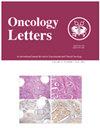Clinical prognostic significance of xeroderma pigmentosum group C and IFN‑γ in non‑small cell lung cancer.
IF 2.2
4区 医学
Q3 ONCOLOGY
引用次数: 0
Abstract
Lung cancer is the most common cancer in the world due to its high incidence and recurrence. Genetic instability is one of the main factors leading to its occurrence, development and poor prognosis. Decreased xeroderma pigmentosum group C (XPC) expression notably enhances the stem cell properties of lung cancer cells and increases their proliferation and migration. Additionally, patients with lung cancer and low XPC expression had a poor prognosis. The purpose of the present study was to analyze the effect of XPC and IFN-γ on the clinical prognosis of patients with non-small cell lung cancer (NSCLC). Lung adenocarcinoma specimens were collected from a total of 140 patients with NSCLC. Additionally, from these 140 patients, 48 paracarcinoma tissue specimens were also collected, which were later used to construct tissue microarrays. The expression of XPC and IFN-γ in cancer tissues and in paraneoplastic tissues was detected using immunohistochemistry. The prognosis and overall survival of patients were determined through telephone follow-up. The results showed a positive correlation between expression of XPC and IFN-γ in NSCLC. Additionally, high expression of both markers was associated with a favorable prognosis in patients with NSCLC. The aforementioned findings suggest that the expression of XPC and IFN-γ has prognostic value in clinical practice and is expected to become a marker for clinical application.非小细胞肺癌中C群色素痣和IFN-γ的临床预后意义
肺癌发病率高、复发率高,是世界上最常见的癌症。遗传不稳定性是导致肺癌发生、发展和预后不良的主要因素之一。C 组色素沉着病(XPC)表达的减少明显增强了肺癌细胞的干细胞特性,并增加了其增殖和迁移。此外,XPC 低表达的肺癌患者预后较差。本研究旨在分析 XPC 和 IFN-γ 对非小细胞肺癌(NSCLC)患者临床预后的影响。研究共收集了140名非小细胞肺癌患者的肺腺癌标本。此外,还从这 140 名患者中采集了 48 份癌旁组织标本,随后用于构建组织芯片。采用免疫组化方法检测了 XPC 和 IFN-γ 在癌症组织和癌旁组织中的表达。通过电话随访确定了患者的预后和总生存期。结果显示,在 NSCLC 中,XPC 和 IFN-γ 的表达呈正相关。此外,这两种标志物的高表达与 NSCLC 患者的良好预后相关。上述研究结果表明,XPC 和 IFN-γ 的表达在临床实践中具有预后价值,有望成为临床应用的标志物。
本文章由计算机程序翻译,如有差异,请以英文原文为准。
求助全文
约1分钟内获得全文
求助全文
来源期刊

Oncology Letters
ONCOLOGY-
CiteScore
5.70
自引率
0.00%
发文量
412
审稿时长
2.0 months
期刊介绍:
Oncology Letters is a monthly, peer-reviewed journal, available in print and online, that focuses on all aspects of clinical oncology, as well as in vitro and in vivo experimental model systems relevant to the mechanisms of disease.
The principal aim of Oncology Letters is to provide the prompt publication of original studies of high quality that pertain to clinical oncology, chemotherapy, oncogenes, carcinogenesis, metastasis, epidemiology and viral oncology in the form of original research, reviews and case reports.
 求助内容:
求助内容: 应助结果提醒方式:
应助结果提醒方式:


